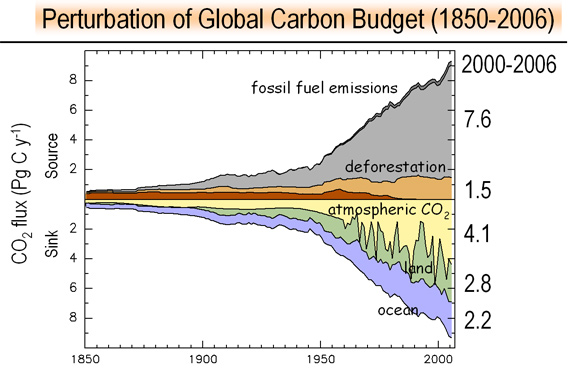North Atlantic carbon sinks absorbing less CO2
North Atlantic carbon sinks absorbing less CO2
mongabay.com
October 23, 2007
The capacity of the North Atlantic ocean to absorb atmospheric carbon dioxide (CO2) has declined significantly since in the mid 1990s, report researchers from the University of East Anglia. The findings raise concerns that oceans may be slowing their uptake of CO2, potentially worsening the climate impact of greenhouse gas emissions.
The results, published in the Journal of Geophysical Research, come as a study in the Proceedings of the National Academy of Sciences report a similar slowdown in the Southern Ocean. However the change in the North Atlantic has been greater and more sudden, say the scientists Dr. Ute Schuster and Professor Andrew Watson of the University of East Anglia’s School of Environmental Sciences.
Measuring carbon dioxide levels in the Atlantic during the mid-1990s and 2002-2005, the researchers found that uptake by the North Atlantic halved.
“Such large changes are a tremendous surprise. We expected that the uptake would change only slowly because of the ocean’s great mass,” said Dr Schuster. “We are cautious about attributing this exclusively to human-caused climate change because this uptake has never been measured before, so we have no baseline to compare our results to. Perhaps the ocean uptake is subject to natural ups and downs and it will recover again.”
Nevertheless Professor says the direction of the change is a concern since it suggests that the ocean may be approaching a carbon saturation point.
“The speed and size of the change show that we cannot take for granted the ocean sink for the carbon dioxide. Perhaps this is partly a natural oscillation or perhaps it is a response to the recent rapid climate warming. In either case we now know that the sink can change quickly and we need to continue to monitor the ocean uptake,” explained Watson.
 Global carbon sinks and sources 1850-2006. Courtesy of the Global Carbon Project, which lead the PNAS study: Carbon sinks failing to keep up with emissions |
Related
Carbon sinks failing to keep up with emissions
(10/22/2007) Atmospheric carbon dioxide (CO2) growth has increased 35 percent faster than expected since 2000, report scientists writing in Proceedings of the National Academy of Sciences. Worryingly, more than half the increase came from a decreased efficiency of natural land and ocean sinks to absorb CO2 from the atmosphere. The reminder came from a slowing in the efficiency of use of fossil fuels.
This article is based on a release from the University of East Anglia